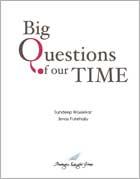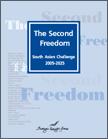Nuclear Arms Race of the 21st Century
 |
July 28, 2014
By Priyanka Bhide
|
The risk of nuclear arms race is coming true as projected in our 2008 report �€œEmerging Issues: Global Security and Economy�€.
-----------------------------------------------------------------------------------------
"The release of atom power has changed everything except our way of thinking...the solution to this problem lies in the heart of mankind. If only I had known, I should have become a watchmaker."
- Albert Einstein
The nuclear arms race of the Cold War era was primarily driven by the politics of power. Countries and international agencies have worked very hard since then on a nuclear non-proliferation agenda, which will prevent such power play from escalating into a catastrophic nuclear war. In recent times there has been a new trend where previously non-nuclear countries in the Middle East and Asia are aggressively pushing for a nuclear agenda. They say it is for peaceful nuclear energy. But once you have a nuclear plant, you have access to fissile material.
In Strategic Foresight Group�€™s 2008 report �€œEmerging Issues: Global Security and Economy�€ we discussed a scenario where such a resurrection of the nuclear arms race would occur. Our scenario was based on important trends taking place at the time which continue today. The first trend was the drastic revival of nuclear energy programmes around the world. At the time of writing the report, over 30 countries were actively considering nuclear energy programmes. Today that number has crossed to over 45 according to the World Nuclear Association; these include several countries from the Middle East and Asia.
The second trend mentioned in our report was America�€™s ambition to promote their nuclear energy sector. The US Department of Energy (DoE) in 2006 proposed a $250 million Global Nuclear Energy Partnership (GNEP) to promote their nuclear industry. GNEP faced great criticism as it was seen to be working against the non-proliferation agenda and the US Congress approved much less funding than proposed. Yet the partnership lived on: GNEP was renamed the International Framework for Nuclear Energy Cooperation (IFNEC) in 2010. In its new avatar, IFNEC has a mission- to promote greater cooperation between countries to �€œensure the expansion of nuclear energy for peaceful purposes proceeds in a manner that is efficient, safe, secure, and supports non-proliferation and safeguards�€. Today IFNEC has 32 member countries, 31 observer countries and three intergovernmental observers.
The third trend observed in the Emerging Issues: Global Security and Economy report was that of the illicit trade of nuclear materials. According to IAEA�€™s Incident and Trafficking Database (ITDB), from January 1993 to December 2013, participating States and some non-participating States reported 2477 incidents, of which 424 involved illegal possession, movement or attempts to illegally trade in or use nuclear material or radioactive sources; 664 involved theft/loss of nuclear/other radioactive material; 1337 involved other unauthorized activities, including the unauthorized disposal of radioactive materials or discovery of uncontrolled sources. Trends of illicit trade in nuclear materials come with the added risk of the materials falling in the wrong hands such as terrorist organizations and other non-state actors.
Today several countries seek cooperation to develop nuclear energy. According to the Nuclear Energy Institute, as of May 2014, 30 countries worldwide are operating 435 nuclear reactors for electricity generation and 72 new nuclear plants are under construction in 15 countries. Access to fissile material combined with illicit trade in materials could be lethal to the non-proliferation agenda. In addition, in the future if one country chooses to use its nuclear material and knowhow to build nuclear weapons, then it is likely to start a nuclear arms race in the region. Thus the drive to seek nuclear energy could end up being a double edged sword.
Related Publications
-
.jpg&maxw=50)
Big Questions of Our time: The World Speaks, 2016
Download:Big Questions of Our time: The World Speaks _Full Report
-

-

Second Freedom South Asian Challenge 2005-2025, 2005
read more
Download:Second Freedom South Asian Challenge 2005-2025 Full Report
Related latest News
Related Conferences Reports
-

Global Challenges Conference, October 2016
Download:Global Challenges Conference Report
-

Conference on Responsibility to the Future: Business, Peace and Sustainability, June, 2008
Download:Global Security and Economy: Emerging Issues


